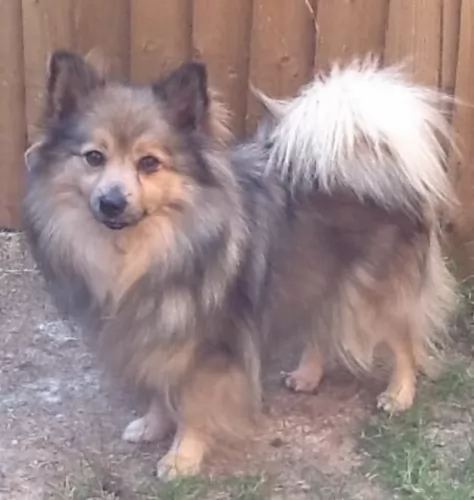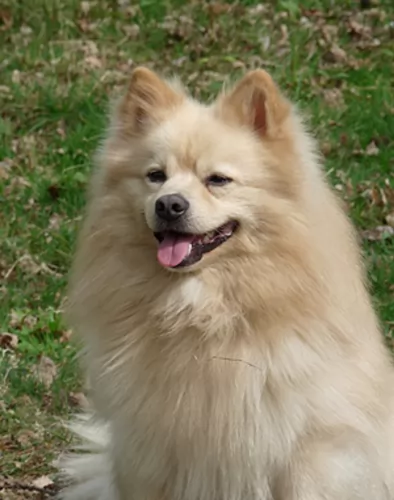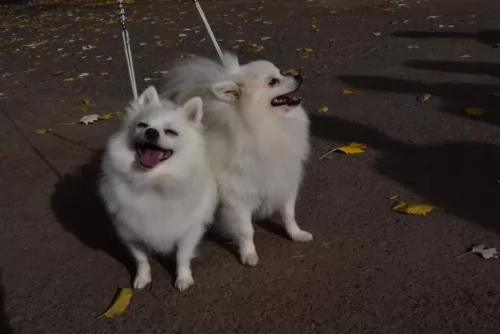 Petzlover
Petzlover German Spitz (Mittel) is originated from Germany but Spanish Mastiff is originated from Spain. German Spitz (Mittel) may grow 50 cm / 19 inches shorter than Spanish Mastiff. German Spitz (Mittel) may weigh 89 kg / 196 pounds lesser than Spanish Mastiff. German Spitz (Mittel) may live 3 years more than Spanish Mastiff. German Spitz (Mittel) may have less litter size than Spanish Mastiff. German Spitz (Mittel) requires Moderate Maintenance. But Spanish Mastiff requires Low Maintenance
German Spitz (Mittel) is originated from Germany but Spanish Mastiff is originated from Spain. German Spitz (Mittel) may grow 50 cm / 19 inches shorter than Spanish Mastiff. German Spitz (Mittel) may weigh 89 kg / 196 pounds lesser than Spanish Mastiff. German Spitz (Mittel) may live 3 years more than Spanish Mastiff. German Spitz (Mittel) may have less litter size than Spanish Mastiff. German Spitz (Mittel) requires Moderate Maintenance. But Spanish Mastiff requires Low Maintenance
 Originating in Germany, the German Spitz Mittel is an alert, vigilant dog and it is these qualities that made him sought after for working on farms.
Originating in Germany, the German Spitz Mittel is an alert, vigilant dog and it is these qualities that made him sought after for working on farms.
He is no new breed and is the 3rd largest of the five German Spitz varieties. It is believed that the German Spitz descended from the Northern sled and herding dogs which arrived with the Vikings into Europe. When you do research you see that the dogs are mentioned in German literature which dates way back to to 1450 already.
 The Spanish Mastiff is a giant breed that comes from Spain. He has always been a guardian dog.
The Spanish Mastiff is a giant breed that comes from Spain. He has always been a guardian dog.
He is an ancient dog breed, in fact dating back to medieval times. He has always been a guardian of livestock, protecting them from attacks from wolves and other predators.
The first breed standard of this pure breed dog was made by the FCI in 1946. A breeding program was also formed for this dog In 1981.
 The German Spitz Mittel is similar in looks to the other sizes of German Spitz. The Mittel is a medium sized dog and stands between 30 and 38cm in height and weighs between 7 and 11kg. You’ll find him in solid colors such as tan, liver, white, fawn, black or a mix of these colors.
The German Spitz Mittel is similar in looks to the other sizes of German Spitz. The Mittel is a medium sized dog and stands between 30 and 38cm in height and weighs between 7 and 11kg. You’ll find him in solid colors such as tan, liver, white, fawn, black or a mix of these colors.
He has a soft woolly undercoat and a long outercoat with a mane-like ruff at the neck. He has a fairly long muzzle, dark eyes, sharp erect ears and a bushy tail which curls over his back.
Affectionate, faithful, and always happy by nature, the German Spitz Mittel is a family companion that wants to be part of everything his human family is up to. He makes a good watchdog. He is alert and has a distrust of strangers.
He gets on well with children in the home and he can also live in peace with other dogs. Because he is an intelligent dog, you won’t have much trouble with training- and socializing him, although he will require a firm, consistent owner and trainer.
Training and socialization are important as there are always some important commands such as sit, stay, come and lie down that you will want him to respond to immediately.
 The Spanish Mastiff weighs between 52 and 100kg and the dog’s height is between 72 and 88cm. He has a thick, heavy coat with rustic colors of fawn, black, grey, reddish and yellow as well as brindle.
The Spanish Mastiff weighs between 52 and 100kg and the dog’s height is between 72 and 88cm. He has a thick, heavy coat with rustic colors of fawn, black, grey, reddish and yellow as well as brindle.
He is powerful and muscular with a huge head. The ears are medium length and floppy and the tail is long. If you were looking for a puppy, the American Kennel Club is the only site which has 100% puppies from AKC-Registered litters.
Large, kind, gentle and intelligent, the Spanish Mastiff is well balanced. When you see him you won’t find a dog that is light on his feet and who jumps around excitedly. He is a dignified, intelligent dog, quiet and calm.
Even though he is so calm, it is still a good idea to have him trained and socialized as his very size could be a problem. When you tell him to lie down, you want him to listen to you. This big, gentle giant is devoted to his human family ad takes the role of guardian and protector seriously.
He isn’t suited to life in the city but is better suited to a large property, also because he has a loud bark.
 People who have owned a German Spitz Mittel are delighted with him, saying that he is such an easy-going, happy dog. He is social and thrives on the interaction he has with his human family.
People who have owned a German Spitz Mittel are delighted with him, saying that he is such an easy-going, happy dog. He is social and thrives on the interaction he has with his human family.
He won’t do well if you simply put him in your backyard and forget about him, using him merely as a watchdog.
The German Spitz Mittel dog is one dog that definitely lives up to the title of man’s best friend. He is social, happy, loving, loyal, playful, entertaining and smart too, and when you treat him the way he deserves, you’ve got the most awesome friend.
 Kind, gentle, quietly confident and intelligent are just some of the wonderful characteristics of the Spanish Mastiff.
Kind, gentle, quietly confident and intelligent are just some of the wonderful characteristics of the Spanish Mastiff.
You can add loyalty and devotion to these characteristics too and the fact that he wants to protect you.
Your gentle giant is guaranteed to make you the most wonderful companion and he deserves the very best treatment there is.
 German Spitz dogs are healthy, and when you shower him with love and attention and good food, you can expect to have him around for up to 15 years of age.
German Spitz dogs are healthy, and when you shower him with love and attention and good food, you can expect to have him around for up to 15 years of age.
Of course, as with any other healthy dog breeds, there are always one or two common dog illnesses that your dog may get. These include hip dysplasia and eye diseases. If you notice symptoms that indicate possible joint issues with your pet, get him to the vet immediately.
Patellar Luxation for instance occurs when your dog’s kneecap is dislocated. It is more common in toy breeds like the German Spitz. It can be painful for your pet and lead to lameness. If your dog has problems with his hip, it can actually force the patella out of its groove, which is a secondary condition.
 It is good to be wise about some of the common dog problems there are that could plague your Spanish Mastiff. Vets are very familiar with these dog illnesses and they tailor their treatment to suit the needs of your dog.
It is good to be wise about some of the common dog problems there are that could plague your Spanish Mastiff. Vets are very familiar with these dog illnesses and they tailor their treatment to suit the needs of your dog.
Remember to get your pet vaccinated against the terrible diseases you get that can kill a dog – rabies, parvo and distemper.
People often think that obesity is something that isn’t dangerous, when in fact it is a serious disease that can cause joint problems, digestive disorders, heart disease, back pain and hip dysplasia.
Dogs rely on water just like what humans do to keep them healthy and functioning properly.
Water is critically important to every organ and also assists with digestion. Your dog is panting and urinating throughout the day and needs to replace the liquid he loses.
Dehydration in dogs results in loss of electrolytes, such as sodium, chloride, and potassium.This is bad as these minerals have important functions.
A dog that is dehydrated has loss of appetite, loss of skin elasticity, is lethargic, has sunken eyes, wants to vomit, has a dry nose and thick saliva. No dog should ever be left without a constant supply of fresh, cool water day and night.
 You can help reduce loose hairs with your German Spitz by brushing his thick coat twice a week. It’s a good time to also inspect your dog for ticks and fleas.
You can help reduce loose hairs with your German Spitz by brushing his thick coat twice a week. It’s a good time to also inspect your dog for ticks and fleas.
Your German Spitz Mittel isn’t the most active dog, but he will still need regular exercise. Going on a walk is good for both you and him. He is a mentally sharp dog too and these walks keep him both physically- and mentally fit. He also loves ball games.
Every dog deserves the best food, and if you feed your German Spitz Mittel with a commercially manufactured dog food, make sure its one of the top quality ones. You want to avoid foods packed with preservatives, colorants and fillers. You want dog foods with minerals and vitamins with high protein and ingredients such as Omega 3 and 6 to promote health skin.
There are also some dog foods which have ingredients in them such as polyphosphates. Ingredients like this keep your dog’s teeth clean.
Try and also give him some cooked rice, vegetables and chicken mixed into his kibble from time to time as well as raw meat. He should never be without fresh, cool water.
 These are giant breed dogs, so you have to be careful with the way you feed them. Large dogs like these are prone to hip dysplasia so you need to choose a food which has ingredients that work to prevent this disease.
These are giant breed dogs, so you have to be careful with the way you feed them. Large dogs like these are prone to hip dysplasia so you need to choose a food which has ingredients that work to prevent this disease.
You have to be very careful that you don’t overfeed your dog so that the extra weight puts strain on the joints.
This dog will do well with some raw meat added into his diet. Also, include home-made food too. Boiled chicken, brown rice or pasta, sweet potatoes, carrots and spinach chopped up and added to his dry kibble for giant breeds. Added in twice a week can do him the world of good.
A good bush of the thick coat twice a week will keep the Spanish Mastiff looking his best.
The nails will also need to be trimmed regularly to avoid overgrowth and to avoid the nails catching onto things. The ears too should be checked regularly to avoid dampness inside the ear which can cause bacteria.
As a fully grown adult, the Spanish Mastiff isn’t a frisky, frolicking dog but he will still require daily exercise. Options for exercise include long walks, hikes, swimming and ball games.